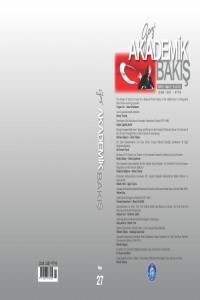Vekâlet Savaşında Yanlış Hesap: Suriye İç Savaşında Amerika Birleşik Devletleri ve Rusya’ya Neoklasik Realist Perspektiften Bakış
Abstract
Bu makale dünyadaki en büyük askeri güç olan Amerika Birleşik Devletleri’nin Suriye İç Savaşında nasıl masanın dışına itildiğini, dünyanın gerileyen gücü Rusya’nın ise tam ters şekilde nasıl tek aktör haline geldiği sorusunu çözmeyi amaçlamaktadır. Makale bu soruya neoklasik realist bakış açısıyla cevap verecektir. Buna göre devletler her zaman rasyonel davranmazlar. Yanlış hesap sonucu başarısız olabilirler. Bu bakımdan ABD de Suriye’deki iç savaşı ve politikayı yanlış hesaplamıştır. Buna karşılık, Rusya stratejik kültürüne uygun olarak sahada ve diplomaside hakim hale gelmiştir. Bağımsız değişken olan sistemik uyarıcılar her iki ülkeyi de ittifaklara zorlamıştır. Ara değişken olan iç aktörler ise her iki ülkenin farklı istikametlerde davranamsını sağlamıştır. ABD siyasi eliti bölünmüş bir yapıda olduğu için yanlış hesap yapılmış, Rus eliti ise daha birlik olması dolayısıyla etkili sonuçlar elde etmiştir.
References
- AKBARZADEH, Shahram, and Arif Saba. “UN paralysis over Syria: The responsibility to protect or regime change?” International Politics 56, no. 4 (2019): 536– 50. https://doi.org/10.1057/s41311-018-0149-x.
- ALLISON, Roy. “Russia and Syria: Explaining alignment with a regime in crisis.” International Affairs 89, no. 4 (2013): 795–823. https://doi.org/10.1111/1468- 2346.12046. ASSEBURG, Muriel, Wolfram Lacher, and Mareike Transfeld. “Mission impossible? UN mediation in Libya, Syria and Yemen.” Stiftung Wissenschaft und Politik -SWP- Deutsches Institut für Internationale Politik und Sicherheit, Berlin,
- 2018. https://nbn-resolving.org/urn:nbn:de:0168-ssoar-60446-4. BBC Turkish. “Suriye Annan Planı’nı kabul etti.” 2012. Accessed January 26, 2020. https://www.bbc.com/turkce/haberler/2012/03/120327_syria_annan.
- BBC Turkish. “Barış Pınarı Harekâtı - Pentagon: Türkiye’nin Olası Harekât Güzergâhı Üzerindeki Güçlerimizin Yerini Değiştirdik.” 2019. Accessed November 4, 2019. https://www.bbc.com/turkce/haberler-dunya-49980630.
- CROSSTON, Matthew D. “Cold War and Ayatollah Residues Syria as a Chessboard for Russia, Iran, and the United States.” Strategic Studies Quarterly 8, no. 4 (2014): 94–111.
- CROWLEY, Michael, and Carlotta Gall. “In Trump, Turkey’s Erdogan Keeps Finding a Sympathetic Ear.” Accessed November 4, 2019. https://www.nytimes.com/2019/10/08/us/politics/trump-erdogan-turkey-visit.html.
- ÇAKMAK, Cenap, and Ali Onur Özçelik. “The World Community and the Arab Spring.” 2019. https://doi.org/10.1007/978-3-319-60985-0.
- DEMIRCI, Yasin. “Suriye Krizinde “Anayasa Komitesi” Dönemeci.” Accessed October 28, 2019. https://www.aa.com.tr/tr/info/info/infografik/15990.
Miscalculation in Proxy War: The United States and Russia in Syrian Civil War from the Neoclassical Realist Perspective
Abstract
This article aims to puzzle why the leading military power of the world, namely the United States, was pushed back from the negotiating table in the Syrian Civil War, and conversely, how and why the world’s declining power, namely Russia, became the sole actor in that conflict. The article will try to answer this question from the neoclassical realist perspective. In this perspective, states do not always act rationally. Instead, they can fail because of miscalculations. The United States, in this respect, miscalculated on the Syrian Civil War as well as its domestic politics. In contrast, Russia behaved in accordance with its strategic culture, which resulted in its dominance both in the field and in diplomacy. The systemic stimulus, which is the independent variable, forces both countries to form alliances in the civil war. The
domestic actors of both countries, which are the intervening variables, diversified the systemic stimuli in opposite directions. While the US political elite was misguided due to the divided structure, the Russian elite was more unified, which resulted in outcomes in favor of the latter.
References
- AKBARZADEH, Shahram, and Arif Saba. “UN paralysis over Syria: The responsibility to protect or regime change?” International Politics 56, no. 4 (2019): 536– 50. https://doi.org/10.1057/s41311-018-0149-x.
- ALLISON, Roy. “Russia and Syria: Explaining alignment with a regime in crisis.” International Affairs 89, no. 4 (2013): 795–823. https://doi.org/10.1111/1468- 2346.12046. ASSEBURG, Muriel, Wolfram Lacher, and Mareike Transfeld. “Mission impossible? UN mediation in Libya, Syria and Yemen.” Stiftung Wissenschaft und Politik -SWP- Deutsches Institut für Internationale Politik und Sicherheit, Berlin,
- 2018. https://nbn-resolving.org/urn:nbn:de:0168-ssoar-60446-4. BBC Turkish. “Suriye Annan Planı’nı kabul etti.” 2012. Accessed January 26, 2020. https://www.bbc.com/turkce/haberler/2012/03/120327_syria_annan.
- BBC Turkish. “Barış Pınarı Harekâtı - Pentagon: Türkiye’nin Olası Harekât Güzergâhı Üzerindeki Güçlerimizin Yerini Değiştirdik.” 2019. Accessed November 4, 2019. https://www.bbc.com/turkce/haberler-dunya-49980630.
- CROSSTON, Matthew D. “Cold War and Ayatollah Residues Syria as a Chessboard for Russia, Iran, and the United States.” Strategic Studies Quarterly 8, no. 4 (2014): 94–111.
- CROWLEY, Michael, and Carlotta Gall. “In Trump, Turkey’s Erdogan Keeps Finding a Sympathetic Ear.” Accessed November 4, 2019. https://www.nytimes.com/2019/10/08/us/politics/trump-erdogan-turkey-visit.html.
- ÇAKMAK, Cenap, and Ali Onur Özçelik. “The World Community and the Arab Spring.” 2019. https://doi.org/10.1007/978-3-319-60985-0.
- DEMIRCI, Yasin. “Suriye Krizinde “Anayasa Komitesi” Dönemeci.” Accessed October 28, 2019. https://www.aa.com.tr/tr/info/info/infografik/15990.
Details
| Primary Language | English |
|---|---|
| Journal Section | Articles |
| Authors | |
| Publication Date | December 10, 2020 |
| Published in Issue | Year 2020 Volume: 14 Issue: 27 |
Cite
Cited By
Ukrayna Savaşı’nın Rusya-İran İlişkilerine Etkileri
Dumlupınar Üniversitesi Sosyal Bilimler Dergisi
https://doi.org/10.51290/dpusbe.1340919
Gazi Akademik Bakış Dergisi Creative Commons Atıf-GayriTicari 4.0 Uluslararası Lisansı ile lisanslanmıştır.


